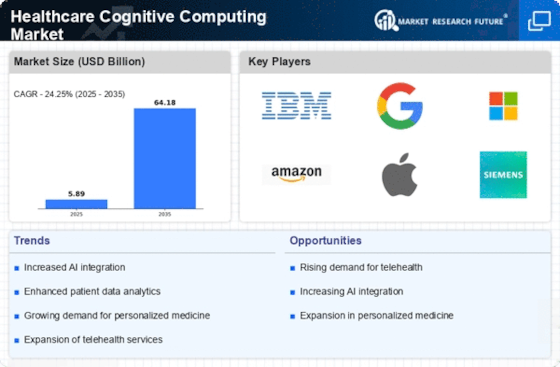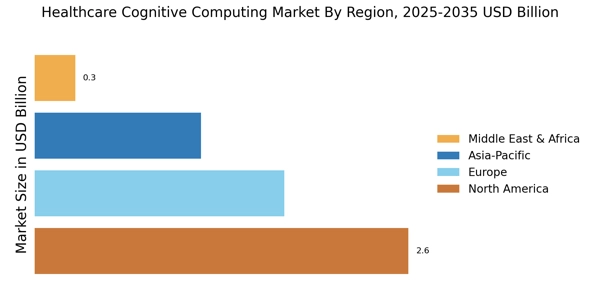Growing Focus on Personalized Medicine
The growing focus on personalized medicine is reshaping the Healthcare Cognitive Computing Market. As healthcare providers increasingly recognize the importance of tailoring treatments to individual patient needs, cognitive computing technologies are becoming essential. These technologies facilitate the analysis of genetic, environmental, and lifestyle factors, enabling healthcare professionals to develop customized treatment plans. The market for personalized medicine is anticipated to reach USD 2.5 trillion by 2025, underscoring the potential for cognitive computing to enhance patient outcomes. By leveraging cognitive computing, healthcare providers can offer more precise and effective interventions, thereby improving overall patient satisfaction and health results.
Advancements in Artificial Intelligence
Advancements in artificial intelligence (AI) are significantly influencing the Healthcare Cognitive Computing Market. AI technologies, such as machine learning and natural language processing, are being integrated into healthcare applications to improve diagnostics, treatment planning, and patient management. The ability of AI to process and analyze complex datasets allows for the identification of patterns that may not be apparent to human practitioners. This capability is expected to drive the market, with AI in healthcare projected to reach USD 31 billion by 2025. The integration of AI into cognitive computing systems enhances their functionality, making them indispensable tools for healthcare providers aiming to deliver personalized and efficient care.
Regulatory Support for Innovative Technologies
Regulatory support for innovative technologies is a crucial driver of the Healthcare Cognitive Computing Market. Governments and regulatory bodies are increasingly recognizing the potential of cognitive computing to transform healthcare delivery. Initiatives aimed at fostering innovation, such as funding for research and development, are being implemented to encourage the adoption of cognitive technologies. This supportive regulatory environment is expected to propel market growth, as it facilitates the integration of cognitive computing solutions into existing healthcare frameworks. As a result, healthcare organizations are more likely to invest in these technologies, leading to enhanced patient care and operational efficiencies.
Rising Demand for Efficient Healthcare Solutions
The increasing demand for efficient healthcare solutions is a primary driver of the Healthcare Cognitive Computing Market. As healthcare systems face mounting pressure to improve patient outcomes while reducing costs, cognitive computing technologies offer innovative solutions. These technologies enable healthcare providers to analyze vast amounts of data quickly, leading to more informed decision-making. According to recent estimates, the healthcare cognitive computing market is projected to reach USD 36 billion by 2025, reflecting a compound annual growth rate of approximately 30%. This growth is indicative of the healthcare sector's shift towards data-driven approaches, where cognitive computing plays a pivotal role in enhancing operational efficiency and patient care.
Increased Investment in Healthcare IT Infrastructure
Increased investment in healthcare IT infrastructure is a significant driver of the Healthcare Cognitive Computing Market. As healthcare organizations strive to modernize their operations, there is a growing emphasis on upgrading IT systems to support advanced technologies. Investments in cloud computing, data analytics, and cybersecurity are essential for the successful implementation of cognitive computing solutions. The healthcare IT market is projected to reach USD 280 billion by 2025, indicating a robust trend towards digital transformation. This investment not only enhances the capabilities of healthcare providers but also creates a conducive environment for the adoption of cognitive computing technologies, ultimately improving patient care and operational efficiency.

















